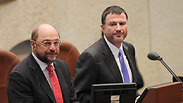
What really happened? The European Parliament president said (in German) that a young Palestinian had asked him why the Israelis in the territories can use 70 cubic meters of water while the Palestinians can only use 17. He further said that the Gaza siege causes distress.
Anti-Semitism, incitement, destruction: These are explosive words in the Israeli discourse, and always spark interest.
It's useless for a president of anything, if he's German, to deliver a long speech of apology about his nation's crimes against Jews, to explain that it isn't really like that and to state that we must learn from the crimes of the past how to create a better future for everyone.
The visits to Yad Vashem and the wreaths on the victims' graves and the bending of the head and the tears won't help – parts of the Israeli public will always label Germans as a type of Nazi, and will always create great interest mixed with panic in their reactions to Germans.
"Liar!" Bayit Yehudi members lashed out at him. For what? He himself said that he did not check the facts, at least in regards to the water. And the Bayit Yehudi members did not check them either, and could throw neither the facts nor the truth at him. Only insulting labeling, only fiery words, only a vicious and grave accusation of anti-Semitism.
The facts are what is really important, but not very interesting, and it's hard to pull those up from independent sources. It is clear and known that the settlers' water consumption is much higher than their Palestinian neighbors' consumption, and it's clear that the Palestinians are experiencing an ongoing water shortage, which can sometimes be seen at the margins of news reports.
Why does it happen? There are many reasons, and one of them really is Israel's water allotment policy. But that's not the only reason. Our water relations with the Palestinians, which were defined in the Oslo B agreement, are emotionally charged and problematic and complicated relations, and both sides accuse each other of repeatedly violating the agreement – and both sides are right.
Ahead of the current negotiations, independent professional sources suggested that Israel make a gesture to the Palestinians and as a one-off release a large amount of water, which would lead to a process of discussing illegal drilling, handling wastewater and what not. These are confidence-building steps that are relatively easy to take for Israel, and are very important to the Palestinians. But that did not happen, and the distress remains unchanged.
"Liar!" the Bayit Yehudi members told him when Martin Schulz claimed that the Gaza siege creates distress. Excuse me, doesn’t it?
The Strip depends on Israel to secure the supply of food, building materials and anything else they need, from medication to snacks. Random and unclear changes in the siege conditions are an acceptable punishment measure by Israel, which are occasionally imposed on the civil population in Gaza.
One can argue whether this is legitimate or not, but is there no distress? Simple human distress? Or perhaps the Bayit Yehudi members have chosen as usual to only see the (completely genuine) distress of the residents of the south following the rocket fire from the Gaza Strip, and they simply can’t understand that there are human beings on the other side too.
Jewish-Arab coexistence
No, Martin Schulz did not lie. He wanted to report to the Knesset what he had heard from Palestinians, and that's what he did. He said he had not checked the facts. None of us, in the fiery, explosive and inflammable discourse, is really interested in the facts. Especially the Bayit Yehudi members, who are only interested in incitement and explosiveness.
"Liar, and in German of all languages!" they lashed out at him. This is the time and place to tell them to read one book in particular.
"Altneuland" by Theodor Herzl, the most beautiful and most utopian vision of the Jewish state published in 1902, is written entirely in German, and includes a sweet, wild dream about an egalitarian society where Arabs and Jews enjoy the fruits of the European culture together and enlightened coexistence between civilized people.
Everyone speaks German in this book, including the Arabs who express their gratitude to the Jews who saved them from distress and shortage. Even Naftali Bennett can appreciate the irony, at the end of a day of demagogic shouting, complete absence of facts and a great celebration in the headlines.
Ironically, Martin Schulz and his remarks – and in German of all languages – are closer to Herzl's vision than the Bayit Yehudi members.















